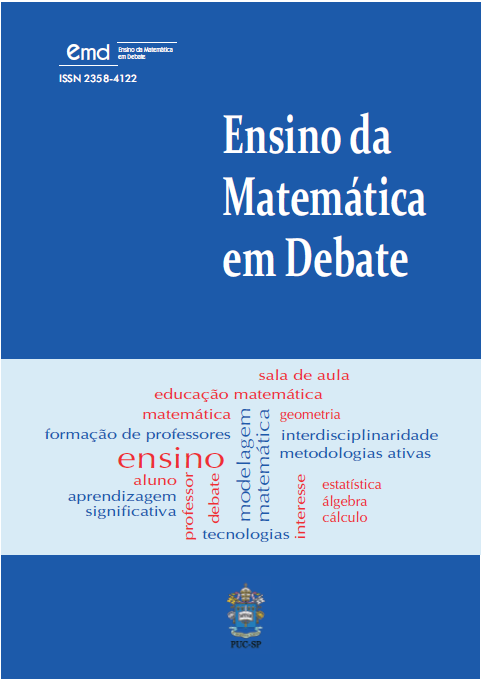Investigative movements based on different lessons on the introduction to functions
Keywords:
Pedagogical Residency, Landscapes of investigation, Model of Semantic Fields, Initial teacher education, FunctionAbstract
This article describes five lessons carried out by five residents as part of the Mathematics subproject of the Pedagogical Residency Program at a Federal University in the south of Minas Gerais, in a collaborative format, to address the introduction of the concept of function, under the guidance of the supervising and precepting teachers and the researcher from the Masters in Education at the same institution. The aim of this article, in addition to describing these lessons, is to analyze them, placing ourselves in the position of teachers who are researchers of our actions, highlighting the appropriation of Ole Skovsmose's theorizing on landscapes of investigation. To do this, we used the concepts of landscapes of investigation, dialog and the production of meanings as a theoretical framework for analysis, which were also discussed with the residents at the weekly team meetings to prepare their regencies. These meetings are part of the activities developed by the Mathematics subproject team and constitute a shared space for experiences. As a main result, we highlight that the different classes enable different ways of producing meanings based on the students' experiences with school content or experiences outside school and the team's production of meanings about the creation of landscapes of investigation in the classroom and the students' reading. The biggest difficulty the residents pointed out was establishing and maintaining a dialog and not providing answers to activities when they were asked. We believe that we have created investigative moments because at times there were landscapes of investigation and at others difficulties in maintaining them. The course on introduction to the role was fundamental for the other courses that took place afterwards, as this experience was decisive in proposing and trying to create new landscapes of investigation, taking into account the particularities of each class, and made the residents more attentive to the way they acted in the classroom.
References
[NOME5], 2023.
BRASIL. Ministério da Educação.Base nacional comum curricular. Brasília: MEC/SEB, 2017. Disponível em: <http://basenacionalcomum.mec.gov.br/abase/#medio/matematica-e-suas-tecnologias-no-ensino-medio-competencias-especificas-e-habilidades>. Acesso em: 19 abr. 2023.
FERREIRA, J. C.; JULIO, R. S. O problema do cachorro e do coelho: uma perseguição a partir de produções de significados. Revista de Investigação e Divulgação em Educação Matemática, v. 6, n. 1, 2022. Disponível em: https://periodicos.ufjf.br/index.php/ridema/article/view/38516. Acesso em: 11 mar. 2024.
FIORENTINI, D.; LORENZATO, S. Investigação em educação matemática: percursos teóricos e metodológicos. Campinas, SP: Autores Associados, 2006.
LINS, R.C.; GIMENEZ, J. Perspectivas em Aritmética e Álgebra para o século XXI. Campinas: Papirus, 1997.
LINS, R. C. Por que discutir teoria do conhecimento é relevante para a Educação Matemática. In: BICUDO, M. A. V. (org.). Perspectivas em educação matemática: concepções e perspectivas. São Paulo: Editora da Unesp, 1999, p. 75-94.
LINS, R. C. O modelo dos campos semânticos: estabelecimento e notas de teorizações. In: ANGELO, C. L. et al. (Org.). Modelo dos Campos Semânticos e Educação Matemática: 20 anos de história. São Paulo: Midiograf, 2012. p. 11-30.
MILANI, R.; CIVIERO, P. A. G.; SOARES, D. A.; LIMA, A. S. de. O Diálogo nos ambientes de aprendizagem nas aulas de Matemática. Revista Paranaense de Educação Matemática, v. 6, n. 12, p. 221–245, 2017. Disponível em: https://periodicos.unespar.edu.br/index.php/rpem/article/view/6078. Acesso em: 2 mai 2023.
MILANI, Raquel. Transformar Exercícios em Cenários para Investigação: uma Possibilidade de Inserção na Educação Matemática Crítica. Perspectivas da Educação Matemática, v. 13, n. 31, p. 1-18, 2020. Disponível em: https://periodicos.ufms.br/index.php/pedmat/article/view/9863. Acesso em: 11 mar. 2024.
SILVA, G. H. G. Grupos de estudo como possibilidade de formação de professores de matemática no contexto da geometria dinâmica. 2010, 191f. Dissertação (Mestrado em Educação Matemática) - Universidade Estadual Paulista, Instituto de Geociência e Ciências Exatas, 2010.
SKOVSMOSE, O. Cenários para Investigação. Bolema: Boletim de Educação Matemática. Rio Claro, n. 14, 66-91. 2000.
SKOVSMOSE, O. Um convite à educação matemática crítica. Tradução de Orlando de Andrade Figueiredo. Campinas, SP: Papirus, 2014. (Coleção Perspectivas em Educação Matemática).
VIOLA DOS SANTOS, J. R. Grupo de Trabalho como Espaço Formações (ou: arte de produzir efeitos sem causa). Perspectivas da Educação Matemática, v. 11, n. 26, 2019.
Downloads
Published
How to Cite
Issue
Section
License
Copyright (c) 2024 Ensino da Matemática em Debate

This work is licensed under a Creative Commons Attribution-NonCommercial 4.0 International License.

Este obra está licenciado com uma Licença Creative Commons Atribuição 4.0 Internacional.






